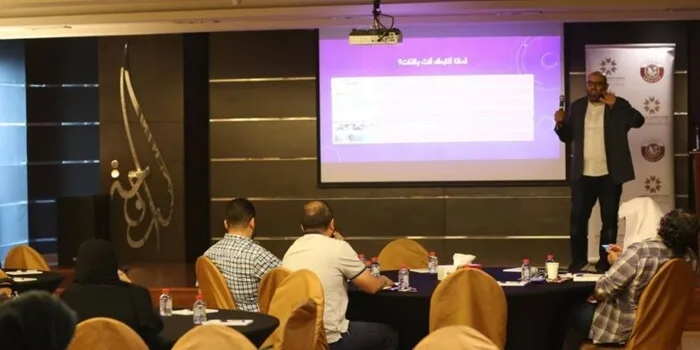Conferences are the intellectual engagement where minds converge, foster innovation and exchange of ideas. They are platforms for individuals to showcase their research, projects, or expertise. However, these events wouldn’t be complete without the pivotal role played by authors. So, what does Author at Conferences mean?
Author at conferences typically refers to someone who presents their research or work at academic or professional conferences. They share their findings, insights, or expertise with an audience of peers, researchers, or professionals in a specific field.
This blog will not only provide you with a clearer understanding of this engaging concept but also explore its significance and impact. So, join us on this journey through the world of conference authorship as we decode its meaning and explore its importance.
Who are the Authors?
Authors are the imaginative creators behind books and writings, weaving tales and imparting wisdom. Their dedication and creativity resonate with readers, transporting them to different worlds and experiences.
From famous novelists to scholarly researchers, authors come from diverse backgrounds, infusing their works with their unique perspectives and writing styles. Their influence extends beyond pages, shaping cultures and sparking conversations.
Authors are the bridge between imagination and reality, their words etching memories in the minds of readers, and their stories becoming timeless treasures in the world of literature. Their impact is immeasurable, leaving an indelible mark on society.
What Does Author at Conferences Mean?
Author at conferences refers to individuals who participate in conferences to share their knowledge and expertise. These authors are not necessarily writers of books but rather presenters who contribute their insights to a broader audience.
These conference authors can come from diverse backgrounds such as academics, professionals, or researchers. They serve as a vital link in the exchange of information, presenting their findings, research, or experiences to an attentive audience.
Their role is to engage the audience, spark discussions, and provide valuable insights into various fields, from scientific discoveries to industry trends. These authors play a pivotal role in fostering learning, networking, and collaboration at conferences, making them an integral part of such events.
What are the Responsibilities of an Author at Conferences?
Authors at conferences hold significant roles in knowledge dissemination and collaboration. Their responsibilities are multifaceted and crucial to the success of such events, ensuring the effective exchange of ideas and expertise.
- Presentation: Authors must deliver engaging talks or presentations, employing visuals and real-world examples to make complex concepts accessible and interesting to the audience.
- Q&A Interaction: They engage in meaningful interactions during question and answer sessions, providing not only answers but also encouraging discussions that foster deeper understanding.
- Networking: Building professional connections with peers, fellow researchers, and industry professionals is essential for potential collaborations and staying updated on the latest trends.
- Knowledge Sharing: Authors share their findings, contributing to the collective understanding and advancement of their field, often through engaging storytelling techniques.
- Staying Updated: Remaining informed about current trends and developments in their area of expertise ensures the relevance and impact of their presentations.
- Publication: Some authors may publish conference papers or materials, making their research widely accessible and fostering further discussion.
- Promotion: Promoting the conference and its involvement through various channels, such as social media or pre-conference webinars, helps maximize its reach and impact.
- Inspiration: Authors inspire others with their work, sharing not only their successes but also the challenges they’ve overcome, encouraging innovation and resilience.
- Collaboration: They actively explore opportunities for collaboration, potentially leading to future projects or research partnerships, creating a lasting impact beyond the conference.
In essence, authors at conferences are catalysts for knowledge exchange, driving progress and innovation within their respective fields.
Who Can Qualify as an Author at Conferences?
In conference settings, authors might be a broad spectrum of people with a variety of experiences who are eager to share their knowledge and views with their communities and beyond. Let’s explore who can qualify as an Author at conferences.
Academics and Researchers
Academics and researchers, often holding advanced degrees, contribute by presenting their studies, experiments, and discoveries, adding depth to conference discussions. They also offer critical peer-reviewed insights, contributing to the academic community.
Industry Professionals
Professionals from various industries, including technology, healthcare, finance, and more, qualify when they share real-world experiences, industry trends, and innovative solutions. Their practical knowledge enhances conferences by providing a bridge between theory and application.
Entrepreneurs and Innovators
Entrepreneurs and innovators, driven by their passion for change, become conference authors by presenting groundbreaking products, technologies, or strategies that have reshaped their respective fields. They offer a glimpse into the future and inspire others to think creatively.
Educators and Instructors
Educators and instructors bring valuable insights into the conference landscape by sharing effective teaching methods, educational research, and successful classroom practices. Their expertise contributes to the continuous improvement of education.
Non-Profit Organizations
Representatives from non-profit organizations enrich conferences by shedding light on their mission-driven work, community impact, and the challenges they tackle. They emphasize the importance of social responsibility and inspire others to get involved.
Thought Leaders and Influencers
Thought leaders and influencers, renowned for their domain expertise, are often invited to share visionary ideas, cutting-edge concepts, and future trends, inspiring and educating audiences. They shape the industry’s direction and challenge conventional thinking.
Essential Steps to Becoming an Author at Conferences
Becoming an author at conferences is an exciting opportunity to share your expertise and contribute to your field’s growth. Here’s a step-by-step guide enriched with additional insights to help you begin on this rewarding journey.
Step 1: Identify Your Area of Expertise
Begin by identifying your passion and strengths within your field. Consider the topics that excite you the most, as your enthusiasm will drive your success. Look for gaps in existing research or areas where your unique perspective can make a difference.
Step 2: Stay Informed and Research
Stay informed not only about the latest trends but also the unique challenges in your chosen area. Engage in discussions, attend webinars, and collaborate with peers to deepen your understanding. Seek mentorship or guidance from established experts.
Step 3: Develop Your Proposal
Craft a persuasive proposal that clearly outlines the practical benefits of your presentation. Emphasize how your insights can address real-world issues and contribute to the conference’s overall goals. Use data and evidence to support your claims.
Step 4: Submit Your Proposal
Follow the submission guidelines meticulously, ensuring your proposal is concise yet comprehensive. Tailor your submission to align seamlessly with the conference’s specific themes and expectations. Consider seeking feedback from colleagues or mentors before submission.
Step 5: Prepare Your Presentation
Dedicate time to create a visually engaging presentation. Incorporate real-world examples and case studies to illustrate your points effectively. Rehearse your delivery to build confidence, and consider peer reviews to refine your content.
Step 6: Engage with Your Audience
Don’t just present; foster a dynamic dialogue with your audience. Encourage questions and discussions, creating an environment where knowledge flows freely. Be open to feedback and be prepared to address varying perspectives.
Step 7: Network and Collaborate
Networking extends beyond your presentation. Connect with attendees, exchange ideas, and explore collaborative ventures. Building relationships enhances your influence and potential impact. Consider joining professional associations related to your field for ongoing networking opportunities.
By following these additional insights in each step, you’ll not only become a successful conference author but also a respected contributor who can make a lasting difference in your field.
Becoming an Author- How Does it Benefit You?
Becoming an author at conferences offers more than just the opportunity to share knowledge. It comes with several personal and professional benefits that enrich your journey. Let’s explore the benefits:
- Knowledge Amplification: Presenting your work deepens your understanding, as you must communicate complex ideas clearly to your audience. This process often leads to deeper insights and more comprehensive expertise.
- Professional Recognition: Authorship enhances your reputation and establishes you as an expert in your field. It can lead to invitations to join expert panels, contribute to publications, or provide consulting services.
- Networking Opportunities: You connect with peers, industry leaders, and potential collaborators, expanding your professional network. These connections can lead to collaborative research projects, job opportunities, or partnerships.
- Skill Development: Being an author at conferences hones your presentation, communication, and research skills, valuable in both academic and corporate settings. These skills are transferrable and can boost your effectiveness in various roles.
- Career Advancement: The exposure and recognition gained from conference authorship can open doors to new career opportunities and promotions. It showcases your commitment to professional development and thought leadership.
- Personal Growth: Overcoming presentation challenges boosts confidence and personal growth. It encourages you to step out of your comfort zone, enhance your public speaking skills, and become a more effective communicator.
- Contribution to Knowledge: By presenting your work, you actively contribute to your field’s growth by sharing insights and discoveries. Your research may inspire others, leading to a collective advancement of knowledge.
Participating as a conference author extends beyond knowledge sharing; it’s a transformative path enriching your personal and professional growth, empowering you to create a significant impact within your field.
Conclusion
To sum it up, we’ve delved into the heart of conferences, uncovering the true meaning of what does author at conferences mean, we found that these individuals, hailing from diverse backgrounds, function as agents of knowledge, disseminating insights, fostering cooperation, and influencing the path of their respective fields.
Engaging as a conference author is a transformative odyssey, one that not only enriches personal and professional growth but also empowers individuals to exert a substantial influence within their domains.
So, whether you’re an academic, a seasoned industry expert, a visionary thought leader, or an inventive trailblazer, embracing the role of an author at conferences is akin to unlocking a portal to a realm brimming with opportunities and intellectual exchange, catalyzing progress and innovation in your chosen field.








